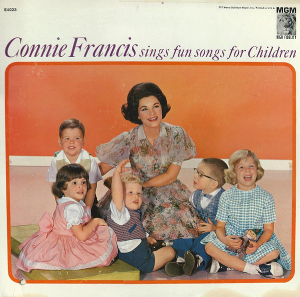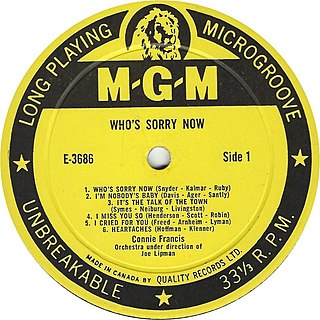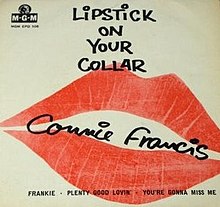
Concetta Rosa Maria Franconero , known professionally as Connie Francis, is an American pop singer, actress, and top-charting female vocalist of the late 1950s and early 1960s. She is estimated to have sold more than 100 million records worldwide.

Neil Sedaka is an American singer, songwriter and pianist. Since his music career began in 1957, he has sold millions of records worldwide and has written or co-written over 500 songs for himself and other artists, collaborating mostly with lyricists Howard "Howie" Greenfield and Phil Cody.
"You Always Hurt the One You Love" is a pop standard with lyrics by Allan Roberts and music by Doris Fisher. First recorded by the Mills Brothers, whose recording reached the top of the Billboard charts in 1944, it was also a hit for Sammy Kaye in 1945.
"Answer Me" is a popular song, originally titled "Mütterlein", with German lyrics by Gerhard Winkler and Fred Rauch. "Mütterlein" was published on 19 April 1952. English lyrics were written by Carl Sigman, and the song was published as "Answer Me" in New York on October 13, 1953. Contemporary recordings of the English lyric by Frankie Laine and David Whitfield both topped the UK Singles Chart in 1953.
"I Believe" is a popular song written by Ervin Drake, Irvin Abraham, Jack Mendelsohn and Al Stillman in 1953. The most popular version was recorded by Italian-American singer Frankie Laine, and spent eighteen weeks at No. 1 on the UK Singles Chart.

"Everybody's Somebody's Fool" is a song written by Jack Keller and Howard Greenfield that was a No. 1 hit for Connie Francis in 1960. A polka-style version in German, "Die Liebe ist ein seltsames Spiel", was the first German single recorded and released by Connie Francis, and it reached No. 1 on the single chart in 1960 in West Germany.
"Hey Joe!" is a 1953 popular song written by Boudleaux Bryant. It was recorded by Carl Smith for Columbia Records on 19 May 1953 and spent eight weeks at No. 1 on the US country music chart, marking Bryant's first no. 1 record. He later wrote songs with his wife Felice for The Everly Brothers. The song was first published in New York on July 17, 1953 as "Hey, Joe".
"Breakin' in a Brand New Broken Heart" is a popular song written by Howard Greenfield and Jack Keller.
"If My Pillow Could Talk" was written by Jimmy Steward, Jr. of the Ravens and Bob Mosley, and was a hit single for Connie Francis.
"Jealous Heart" is a classic C&W song written by American country music singer-songwriter Jenny Lou Carson. In the mid 1940s it spent nearly six months on the Country & Western charts. It was subsequently recorded by several pop singers.

"Kiss Me Goodbye" is a Les Reed/ Barry Mason composition recorded in 1968 by Petula Clark.

"Stupid Cupid" is a song written by Howard Greenfield and Neil Sedaka which became a hit for Connie Francis in 1958.

"When the Girl in Your Arms Is the Girl in Your Heart" is a 1961 hit by Cliff Richard written by the songwriting team of Sid Tepper and Roy Bennett who would contribute fifteen songs to the Cliff Richard canon including his career record "The Young Ones". Produced by Richard's regular producer Norrie Paramor, "When the Girl in Your Arms..." featured backing by the Norrie Paramor Orchestra. Richard's own group the Shadows backed him on the B-side "Got a Funny Feeling".

"Forget Domani" is a song introduced in the 1964 film The Yellow Rolls-Royce being a composition by Riz Ortolani, who scored the film, and lyricist Norman Newell.

Connie Francis sings Fun Songs For Children is a studio album of children's songs recorded by American pop singer Connie Francis. It is one of the few U. S. albums by Connie Francis to be released exclusively in mono. All songs were co-written by George Goehring who had provided Francis earlier that year with one of her biggest hits, Lipstick On Your Collar.

My Thanks to You is a studio album recorded by American entertainer Connie Francis. The album features songs which had been popular on both sides of the Atlantic between the 1920s and the 1940s. It was recorded March 4–6, 1959, at EMI's famous Abbey Road Studios in London.

Connie's Greatest Hits is a studio album by U. S. Entertainer Connie Francis. The album features the songs from Francis' most successful singles from her breakthrough hit Who's Sorry Now? in early 1958 up to the date of the album's release in November 1959.

Who's Sorry Now? is the first studio album recorded by U. S. Entertainer Connie Francis.
"I'll Be There "' is a song co-written and originally released as a single by American country artist Ray Price. After becoming a major country hit in 1954, the song has been covered by numerous artists such as Cowboy Copas, Elvis Presley, Connie Smith, Johnny Bush, George Jones and Tammy Wynette, Ronnie Milsap, Heather Myles, Martina McBride, Sam Palladio, Don White & Eric Clapton, Willie Nelson, Nick Lowe, Gail Davies and J. J. Cale.
"Frankie" is a song written by Howard Greenfield and Neil Sedaka and performed by Connie Francis featuring the Ray Ellis Orchestra. It reached #9 on the U.S. pop chart and #17 on the U.S. R&B chart in 1959.











